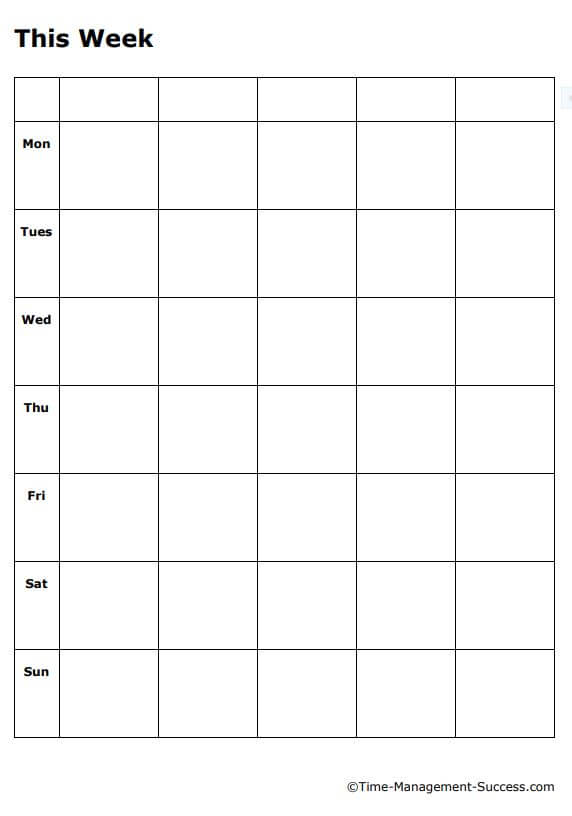Better Family Time Management

Includes Printable Weekly Family Planner Sheets
Family time management has to be one of the hardest challenges facing those of us in positions of responsibility at home. As a husband and dad to three I've learnt that things rarely go to plan, but a plan is well worth making anyway.
Both the quantity and quality of your time together depend on your ability to keep on applying good time management skills. It’s an ongoing challenge that never goes away (at least not until the other members of your family do!)
Reduce at least some of the stress and shouting with these 7 tips for family time management...
1. Create routines
Automate as much of your week as you can by building in routines using a time chart. When you do, everyone knows where they stand.
Start with one event that you can turn into a family habit. For example, a set meal time or a bedtime routine for the kids. Then build on it until you’ve got a framework of regular activities. Use a week planner to help you establish a schedule that everyone knows and sticks to.
In our house, we make a real effort to set and stick to bedtimes for our children. We’ve found this to be the most important part of our family routine, just so we get some peace and quiet! Like I said at the start, the plan doesn't always work, but we do at least all know where the line is drawn.
2. Delegate roles and responsibilities
We all do better with a healthy balance between work, rest and play. Teaching your kids to wash, fix, clean and ask things is one of the smartest things you can do, for them and yourself.
Doing it yourself may well seem easier, but over time, the payback for showing and telling is well worth it. Give them some responsibility, exercise not a little patience, and look at the bigger picture. Your whole family will benefit.
When you delegate this way, one of the best things you can do is to help your kids to be proactive. Reward them for taking the initiative and doing it before being asked. Sometimes, showing initiative is more important than the task itself.
3. Put things back
Have you noticed how often, when you can’t find what you want, it’s just before you’re going out or about to do something?
One of the biggest time wasters families have to deal with is looking for things that have been misplaced. Encourage everyone to put things back exactly where they belong, or to ask if they’re not sure.
Try a ‘two minute tidy’ (two minutes doesn’t hurt anyone too much). Set a timer and ask everyone to put things back where they belong. You’ll be surprised at just how effective this is.
4. Use a family time management calendar
This is all about ease of use for encouraging communication.
Family time management hinges on the commitments that everyone has. Your family's week may be organized around the calendar, but it’s only as good as the amount it’s used.
To make sure yours is used, put it in the most visible and accessible place in your house that you’re happy for it to be seen. Kitchens tend to be a good choice.
Online calendars such as Google Calendar are worth considering if you know that everyone will routinely use them.
Alternatively, click on the one below to get a printable weekly version:
Need a different number of columns? Use any of the following options - click on it for a printable version of the above, but with the number of columns you need (opens a new tab):
5. Cut your commitments
If you do just one thing, make it this one. Limit personal and family commitments to only those things that you truly enjoy and value.
Learning how to say no is the best way to cut existing commitments and decline potential ones.
6. Unschedule
A schedule provides a framework for the week. But it’s easy to fall into the trap of over-scheduling everything and everyone.
Make sure everyone has some fenced off free time to do whatever they want. No demands, requests or expectations. Allow each other to just be. This is important to maintain a healthy work-life balance for everyone.
7. Keep a sense of perspective
You can’t do it all. Sometimes plans, schedules and routines get messed up. Sometimes it’s just too hard to say no.
When things go wrong, keep the bigger picture in mind. Family time management is not a smooth ride. Keep practicing it, and get better at it gradually.
Remember who and what is most important to you and organize your time accordingly.
* * *
Family time management at home happens naturally, whether you do it well or not. With that in mind, you can gradually incorporate and improve good habits and techniques that will help benefit everyone under your roof.
Try some systems to make things run smoother. Don’t give up because one isn’t working at first. It probably needs time to bed-in or to be tweaked to suit your circumstances.


